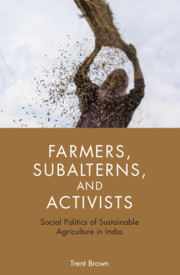Book contents
- Frontmatter
- Dedication
- Contents
- List of Images
- Acknowledgements
- 1 Introduction
- 2 India's Agrarian Crisis: A Gramscian View
- 3 Embedded in Power: Potentials and Constraints of Sustainable Agriculture
- 4 The Kheti Virasat Mission: People's Movement or Agrarian Populism?
- 5 The Tamil Nadu Organic Farmers’ Movement: The Limits of Participatory Approaches
- 6 The Beej Bachao Andolan: How ‘Grassroots’ is the Grassroots?
- 7 Conclusion
- Bibliography
- Index
4 - The Kheti Virasat Mission: People's Movement or Agrarian Populism?
Published online by Cambridge University Press: 08 July 2018
- Frontmatter
- Dedication
- Contents
- List of Images
- Acknowledgements
- 1 Introduction
- 2 India's Agrarian Crisis: A Gramscian View
- 3 Embedded in Power: Potentials and Constraints of Sustainable Agriculture
- 4 The Kheti Virasat Mission: People's Movement or Agrarian Populism?
- 5 The Tamil Nadu Organic Farmers’ Movement: The Limits of Participatory Approaches
- 6 The Beej Bachao Andolan: How ‘Grassroots’ is the Grassroots?
- 7 Conclusion
- Bibliography
- Index
Summary
‘Trentji!’ Umendra Dutt's deep voice resounded across his simple apartment in Jaito. ‘Idhar Aao!’ [come over here!].
It was late and I was in my pyjamas. I had been staying in Dutt's spare bedroom for the past two weeks while undertaking my research about the Kheti Virasat Mission (KVM), a sustainable agriculture organisation of which he was the Executive Director. Throughout the day, I would spend my time in KVM's office, observing their everyday work, taking note of strategic discussions in the office, accompanying KVM staff on fieldwork trips, and interviewing KVM's activists and affiliated farmers to learn more about their work in introducing natural farming to Punjab—a state which has some of India's most chemically intensive agricultural practices.
When Dutt called me, I closed my laptop, in which I had been writing up notes from the day and hurried into his bedroom.
‘Chappal! Chappal!’ he said, pointing to my slippers, which I always forgot to take off before entering his room.
‘Maaf kijie’ [please forgive me] I said, taking them off.
‘Koi baat nahin, chhoti si baat hai’ [It doesn't matter, it's a small thing] he replied in assurance. ‘Would you like to ask some questions?’
I was surprised by the invitation. To date, Dutt had rejected my requests to conduct a formal interview. ‘I am not a cow!’ he would say, smiling wryly, ‘You cannot just milk me for data!’ Instead, he advised me to observe KVM's work and my perspective would develop in time. He preferred me to ask him questions informally, when the time was right, and not just approach him with a list of questions.
Not wanting to miss this rare opportunity for a more structured interview, I took out my recorder and asked if he would mind if I recorded the conversation. ‘Why are you always recording?’ he asked, tutting with irritation.
‘Oh, it just helps me keep track of what we've said later. So that I can quote exactly what you've said in my thesis’.
‘OK, OK’, he said, but I could tell that he wanted me to engage in this research in a more organic way.
- Type
- Chapter
- Information
- Farmers, Subalterns, and ActivistsSocial Politics of Sustainable Agriculture in India, pp. 80 - 113Publisher: Cambridge University PressPrint publication year: 2018



